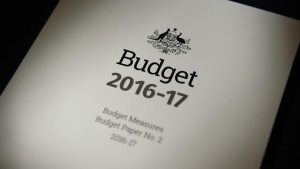 FEDERAL BUDGET
FEDERAL BUDGET
The Turnbull-led Government handed down its 2016/17 Federal Budget last night, which included large changes to superannuation. So what does this mean for you and your clients? Here’s our overview of the key changes outlined. Please note the majority of these changes will be effective from 1 July 2017 (unless otherwise noted) and are subject to the passing of legislation.
SUPERANNUATION
CONCESSIONAL CONTRIBUTIONS CHANGES
- The Government will lower the annual concessional contributions super cap to $25,000 for everyone, from the current $30,000 for people under 50 and $35,000 for people 50 and above.
- People with annual income of over $250,000 will also be required to pay 30% tax on their concessional contributions, up from 15%. Currently, the income threshold this 30% tax rate applies to is $300,000.
- Everyone under the age of 75 will be able to claim an income tax deduction for personal superannuation contributions. From 1 July 2017, all individuals, regardless of their employment circumstances, will be allowed to make concessional superannuation contributions up to the concessional cap. Amounts contributed under this rule will count towards the individual’s concessional contributions cap, and will be subject to 15% contributions tax.
- The Government will allow people with balances under $500,000 who did not reach their $25,000 concessional contribution cap in earlier years to make catch-up concessional super contributions. The proposal is that unused concessional contribution cap amounts from 1 July 2017 will be able to be carried forward on a rolling basis for a period of five consecutive years.
NON-CONCESSIONAL CONTRIBUTIONS CHANGES
- As at 7.30 pm (AEST) on 3 May 2016, the Government introduced a $500,000 lifetime nonconcessional super contributions cap for all Australians under the age of 75. This replaces previous arrangements that allowed people to make non-concessional contributions of up to $180,000 per year (or $540,000 every three years if aged under 65).
- From July next year, the Government will remove the ‘work test’, which currently limits the ability of individuals aged between 65 and 74 to make non-concessional or voluntary superannuation contributions. People aged 65-74 will also be able to make contributions to, and receive contributions from, their spouse without a ‘work test’.
TAX-FREE SUPER BALANCES CAPPED AT $1.6 MILLION
- The Government will introduce a $1.6 million superannuation transfer balance cap on the total amount of super that a person can transfer into their retirement (income stream) phase. This cap will apply to current retirees, as well as people who haven’t entered their retirement phase.
- If a person accumulates over $1.6 million in superannuation, they will be able to keep this excess amount in an accumulation-phase account and earnings will be taxed at the concessional rate of 15%. People already in the retirement phase with balances above $1.6 million will have to reduce their retirement balance to $1.6 million by 1 July 2017, by either transferring the excess super into an accumulation superannuation account or withdrawing the excess amount from their superannuation.
INCOME STREAMS: TTR EARNINGS AND LUMP SUM VS INCOME STREAM PAYMENT ELECTIONS
- The Government will remove the tax exemption for the earnings derived on assets supporting a TTR income stream from 1 July 2017. Earnings from TTR assets will be taxed at 15%, regardless of the commencement date of the TTR income stream.
- Currently, individuals can elect to receive income streams as a lump sum for tax purposes. These payments are then received tax free, provided they are within the low-rate cap (currently $195,000). The proposal is to remove this election. It is not clear from the Budget papers if this will apply solely to TTR income streams or for all income streams or the date of commencement. However, it is likely that the date of commencement will be 1 July 2017.
ANTI-DETRIMENT PAYMENTS
- The tax deduction available to funds that pay an anti-detriment payment as part of a death benefit paid to eligible beneficiaries will be removed from 1 July 2017.



